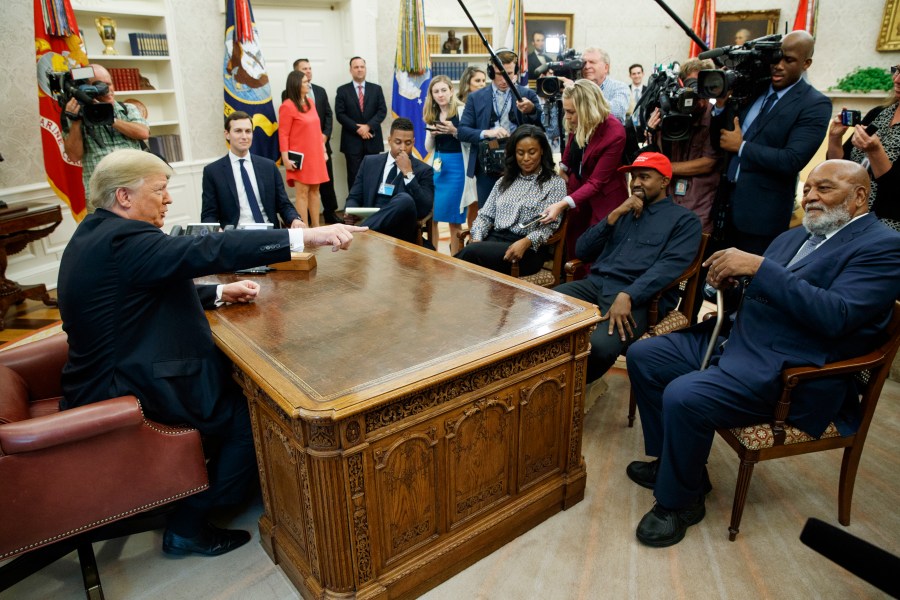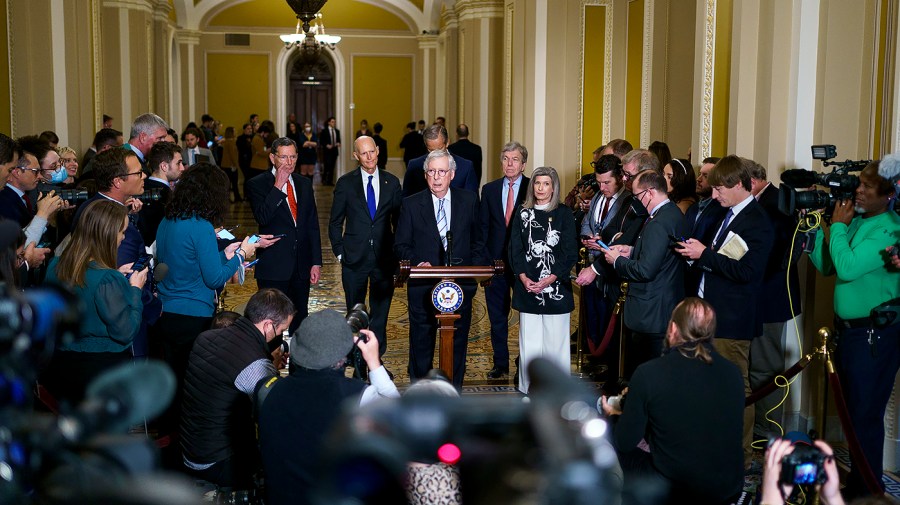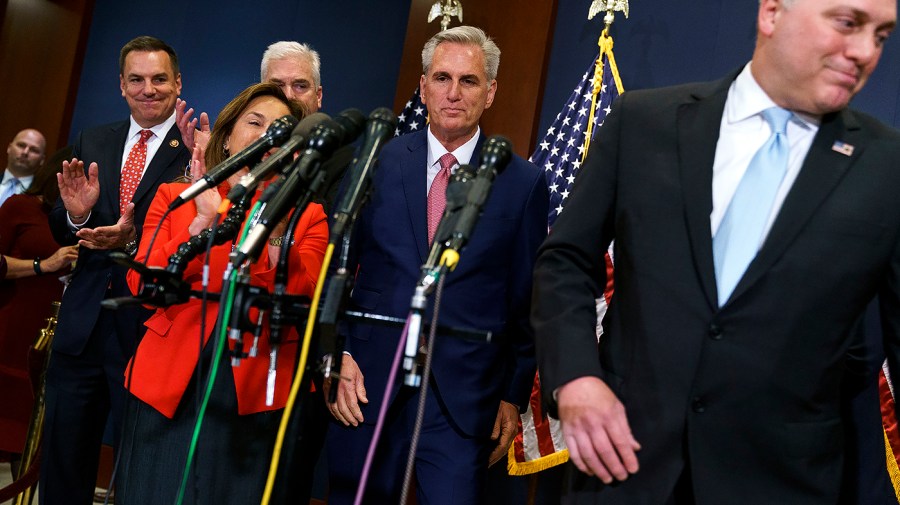The Memo: New controversies deepen GOP’s ‘extremist’ problem
The GOP has an image problem — and it’s not getting better.
Republicans suffered a disappointing midterm election in part because moderate voters saw the party as too extreme.
A string of new controversies isn’t doing anything to soften those edges.
On Saturday, Rep. Marjorie Taylor Greene (R-Ga.) told a gala in New York that the Jan. 6 insurrection would have been more successful had she and former Trump strategist Stephen Bannon organized it.
Expanding on her point, the Georgia congresswoman said that such an attempt “would’ve been armed.”
She later claimed she was being sarcastic.
Earlier this month, the former president himself said on social media that he favored the “termination” of the Constitution — and appeared to suggest he could somehow be reinstated as president.
The bizarre claim came at a time when Republicans were still being buffeted by outrage over former President Trump having dinner at Mar-a-Lago with two noted antisemites: Ye, formerly known as Kanye West, and Nick Fuentes.

FILE – President Donald Trump, left, meets with rapper Kanye West, seated second from right, in the Oval Office of the White House in Washington. (AP Photo/Evan Vucci, File)
Then, on Monday, website Talking Points Memo published texts that were apparently sent to then-White House chief of staff Mark Meadows in the waning days of Trump’s presidency.
Those messages included one from Rep. Ralph Norman (R-S.C.), sent three days prior to President Biden’s inauguration, in which the congressman urged Meadows to encourage Trump to impose martial law — something that he considered “our last hope” in “saving our Republic.”
Put it all together, and it’s a lot of new fuel for the fire that burnt the GOP in the midterms.
In those elections, according to a voter analysis commissioned by The Associated Press and Fox News, 44 percent of voters called “the future of democracy in this country” the single most important factor for them. Among that group, Democrats had a 20-point advantage.
The furors sparked by Trump and his fiercest advocates, such as Greene, have those who favor a more moderate course for the GOP shaking their heads.
“These kinds of irresponsible statements alienate millions of voters, especially independents and swing voters who decide national elections,” one such Republican strategist, Brendan Steinhauser, told this column.
There are signs that the voices of the old GOP establishment are reasserting themselves to try to quell the new storms.
Several leading Senate Republicans distanced themselves from Trump’s early December Truth Social post in which he argued for the “termination of all rules, regulations, and articles, even those found in the Constitution.”

Minority Leader Mitch McConnell (R-Ky.) addresses reporters after the weekly policy luncheon.
Three days later, Senate Minority Leader Mitch McConnell (R-Ky.) noted dryly at his weekly press conference that someone who makes such an argument “seems to me would have a very hard time being sworn in as the president of the United States.”
Senate Minority Whip John Thune (R-S.D.) and Sen. John Cornyn (R-Texas) were among the other senior GOP senators who expressed their displeasure with Trump’s remarks.
Tensions between Trump’s MAGA movement and GOP senators are at a high pitch after the midterms anyways, given that Republicans remain confined to the Senate minority because Trump-backed nominees lost winnable races in Arizona, Georgia, Nevada, New Hampshire and Pennsylvania.
The dynamics between party leadership and the most hard-line GOP members are even more complicated in the House, where Republicans will have 222 seats — a thin majority, and much fewer than they hoped for — in the new session.
There, current Minority Leader Kevin McCarthy (R-Calif.) has to keep support from the whole party — including the hard-liners — if he is to be elected Speaker in January.

House Minority Leader Kevin McCarthy (R-Calif.) addresses reporters following the House Republican leadership election for the 118th session of Congress.
A handful of the most Trumpian members of the conference, including Norman, have said they will not vote for McCarthy.
Rep. Andy Biggs (R-Ariz.) is challenging McCarthy, and Rep. Matt Gaetz (R-Fla.) has been adamant he will not vote for the Californian. Reps. Bob Good (R-Va.) and Matt Rosendale (R-Mont.) are also in the anti-McCarthy camp.
Greene, to the surprise of some of her most vehement supporters, has backed McCarthy for Speaker, and he has pledged to give her back the committee assignments that were stripped from her in early 2021 amid controversy over past comments, including apparent endorsements of violence.
Those maneuvers are, in turn, giving Democrats plenty of material to assert that the GOP is in the hands of extremists.
“We’ve known for a long time that Marjorie Taylor Greene is the real power behind the new majority,” Rep. Sean Patrick Maloney (D-N.Y.) told The Hill earlier this week.
Rep. Jamie Raskin (D-Md.) said that McCarthy and his colleagues “need to decide which side of the insurrection they’re on.”
Democratic strategist Tad Devine told this column that Republicans “are shooting themselves in the foot constantly” and “blew it” in the midterm elections, even while enjoying favorable political conditions.
“The Republicans are a political party who are only interested in their base voters and not interested in the much larger segment of voters who tend to decide general elections,” Devine added.
Democrats, of course, have a partisan interest in making those arguments. And Republicans who back Trump and his right-wing populism insist their approach is boosting working-class support across racial lines, reshaping American politics to the party’s advantage.
But other Republicans, like Steinhauser, take a very different, dimmer view.
“When political figures talk about ‘terminating’ the Constitution or imposing martial law to keep their favorite politician in power, the American voter rightly objects to such rhetoric,” he said.
“Unfortunately, some in the GOP are determined to say outrageous and frightening things that they believe have wide appeal. But they do not, and responsible leaders on the right need to speak out against such rhetoric.”
The Memo is a reported column by Niall Stanage. Mychael Schnell contributed reporting.
Copyright 2024 Nexstar Media Inc. All rights reserved. This material may not be published, broadcast, rewritten, or redistributed..














